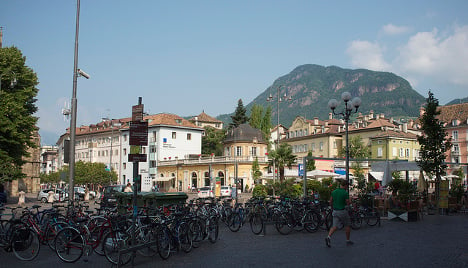Italian daily Il Sole 24 Ore has released its annual quality of life survey, revealing the best and worst places to live in the country. The rankings are based on criteria including the strength of the economy, environmental factors and leisure activities.
The survey named Bolzano in South Tyrol as the city with the best quality of life, followed by Milan, which shot up from eighth place in the rankings last year.
The results seemed to confirm the strong divide between Italy's north and south, with Reggio Calabria finishing last out of the 110 cities and towns analyzed and receiving particularly poor grades for average income, family assets and provision of childcare.
Bolzano had double the employment rate of Reggio Calabria, while Milan’s employment rate was 70 percent higher than that of Naples. The Gini index, a measure of income inequality, is 15 percent higher in the south than the north, and there are three times as many families living in poverty in the south of the country, according to the survey.
This is Bolzano’s fifth year in the top spot of the survey, which has been running for 26 years. It was also crowned the best place to live in 1995, 2001, 2010 and 2012.

Italy's best town? Bolzano from above. Photo: Matt Northam/Flickr.
In addition to its high employment rate, Bolzano was recognized for the high average life expectancy and also scored well in the free time category, which measured the amount of time residents spent at cultural activities such as concerts and taking part in sports.
READ MORE: What makes life in Bolzano so good?
Rome fell to 16th place from 12th last year, with the top ten occupied largely by northern and central regions, with the exception of the Sardinian city of Olbia.
Most of the top-ranked locations are small or medium-sized towns and cities, making Milan’s rise up the league table a surprise. It scored well for welfare – particularly due to good pensions and GDP – as well as services and recreation opportunities, though like most big cities it performed less well in the categories of environment and security.
The survey measures 36 indicators of quality of life, organized into six thematic areas, with a winner was crowned in each of these categories as well as the overall top ten: quality of life (Milan), business and labour (Prato), health services and environment (Monza and Brianza), population (Olbia Tempio), public order (Nuoro), and free time Rimini).
The top 10 Italian cities to live in:
1. Bolzano, South Tyrol
2. Milan, Lombardy
3. Trento, Trentino
4. Florence, Tuscany
5. Sondrio, Lombardy
6. Olbia, Sardinia
7. Cuneo, Piedmont
8. Aosta, Valle D'Aosta
9. Siena, Tuscany
10. Ravenna, Emilia-Romagna
The full map showing the survey's results in Italian can be viewed here.



 Please whitelist us to continue reading.
Please whitelist us to continue reading.
Member comments